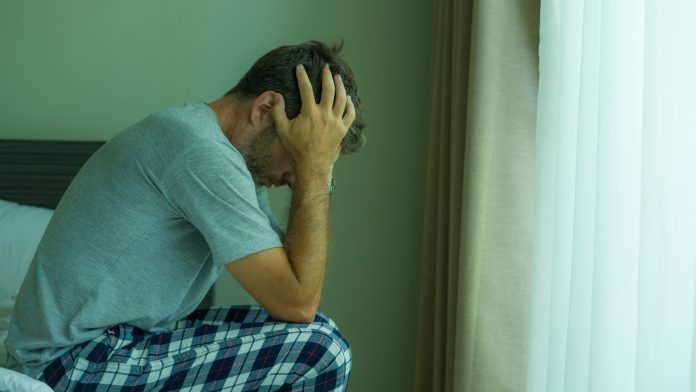
Researchers find that serious COVID-19 illness is linked to an increase in the risk of long-term mental health problems.
The study is the first to look at the long-term prevalence of mental health problems for patients who were bedridden for over seven days following a diagnosis of COVID-19, based on a range of data from six countries. It is well-recorded that mental health problems have grown in prevalence since the COVID-19 pandemic, yet understanding the long-term impacts is vital to grasp the influence that COVID-19 had on mental health.
The new study was published in The Lancet Public Health.
Capturing data from 247,259 individuals
Many studies to date focus on the prevalence of mental health problems for up to six months following a COVID-19 infection, therefore it is relatively unknown about the long-term impact on mental health beyond that period. The researchers set out to fill this knowledge gap.
To capture the impact of long-term mental health problems, the researchers focussed on symptom prevalence of depression, anxiety, COVID-19 related distress, and poor sleep quality amongst people with and without infection from 0-16 months, with the mean follow-up being 5.65 months. The analysis drew upon data from seven cohorts across Denmark, Estonia, Iceland, Norway, Sweden, and the UK.
Of the 247,259 people included, 9,979 (4%) were diagnosed with COVID-19 between February 2020 and August 2021. Self-reports of confirmed positive antibody or PCR-tests for SARS-CoV-2 infection served as an indicator of a COVID-19 diagnosis.
Mental health issues following a COVID-19 infection
Overall, the findings suggest that non-hospitalised patients with a SARS-CoV-2 infection were more likely to experience depressive symptoms up to 16 months after diagnosis compared to those never infected. Patients who were bedridden for seven days or more had higher rates of mental health problems such as depression and anxiety when compared to people who were diagnosed with COVID-19 but were not bedridden.
Furthermore, the analysis found that mental health problems mostly subsided within two months for non-hospitalised patients with COVID-19. However, bedridden patients for seven days or more remained at an increased risk of depression and anxiety over the 16 months.
Delving further, the participants with COVID-19 had a higher prevalence of depression and poorer sleep quality when compared to undiagnosed individuals. The results show that 20.2% versus 11.3% experienced symptoms of depression, 29.4% versus 23.8% experienced poor sleep quality; equivalent to an 18% and 13% increase in prevalence respectively, following the adjustment for other factors including but not limited to age, gender, education, body mass index, and previous psychiatric diagnosis. The study did find that there were no overall differences between participants with or without COVID-19 in anxiety or COVID-related distress rates.
The in-depth analysis found a reduction of some mental health problems such as depression and COVID-19 related distress with time. Contrastingly, the longer time spent bedridden led to a high prevalence of mental health problems. Over the 16 months, patients bedridden for seven days or more continued to be 50-60% more likely to experience depression and anxiety compared to people never infected during the study period.
Study author Professor Unnur Anna Valdimarsdóttir, of the University of Iceland, said: “Our research is among the first to explore mental health symptoms after a serious COVID-19 illness in the general population up to 16 months after diagnosis. It suggests that mental health effects aren’t equal for all COVID-19 patients and that time spent bedridden is a key factor in determining the severity of the impacts on mental health. As we enter the third year of the pandemic, increased clinical vigilance of adverse mental health among the proportion of patients with a severe acute disease of COVID-19 and follow-up studies beyond the first year after infections are critical to ensure timely access to care.”
Co-author Ingibjörg Magnúsdóttir, of the University of Iceland, added: “The higher occurrence of depression and anxiety among patients with COVID-19 who spent seven days or longer bedridden could be due to a combination of worrying about long-term health effects as well as the persistence of physical long COVID symptoms well beyond the illness that limit social contact and may result in a sense of helplessness. Equally, inflammatory responses among patients with a severe diagnosis may contribute to more persistent mental health symptoms. Contrastingly, the fact that individuals with a mild COVID-19 infection can return to normal lives sooner and only experience a benign infection likely contributes to the lower risk of negative mental health effects we observed.”
Limitations within the study
Limitations noted included individuals with COVID-19 were slightly more likely to have a past diagnosis of psychiatric disorders than individuals without COVID-19, although the absolute differences in psychiatric disorder history never exceeded 4% in any of the cohorts and did not impact the interpretation. Moreover, the study reflected self-reported data of COVID-19 diagnosis and mental health problems – the coexistence of two or more conditions – that are interrelated to some extent.
The researchers also observed that most of the comparison groups responded between April and June 2020, and responses from COVID-19 patients were collected between April 2020 and August 2021. This may have led to varying degrees of pandemic uncertainty that may have influenced the reporting of symptoms. Additionally, individuals diagnosed with COVID-19 were on average younger than those not diagnosed, indicating that some older patients with a COVID-19 diagnosis might have been missed. Furthermore, different recruitment strategies of the included cohorts impeded direct comparisons as national cohorts specifically targeted individuals tested for or diagnosed with COVID-19 in their recruitment, whereas others did not.
























